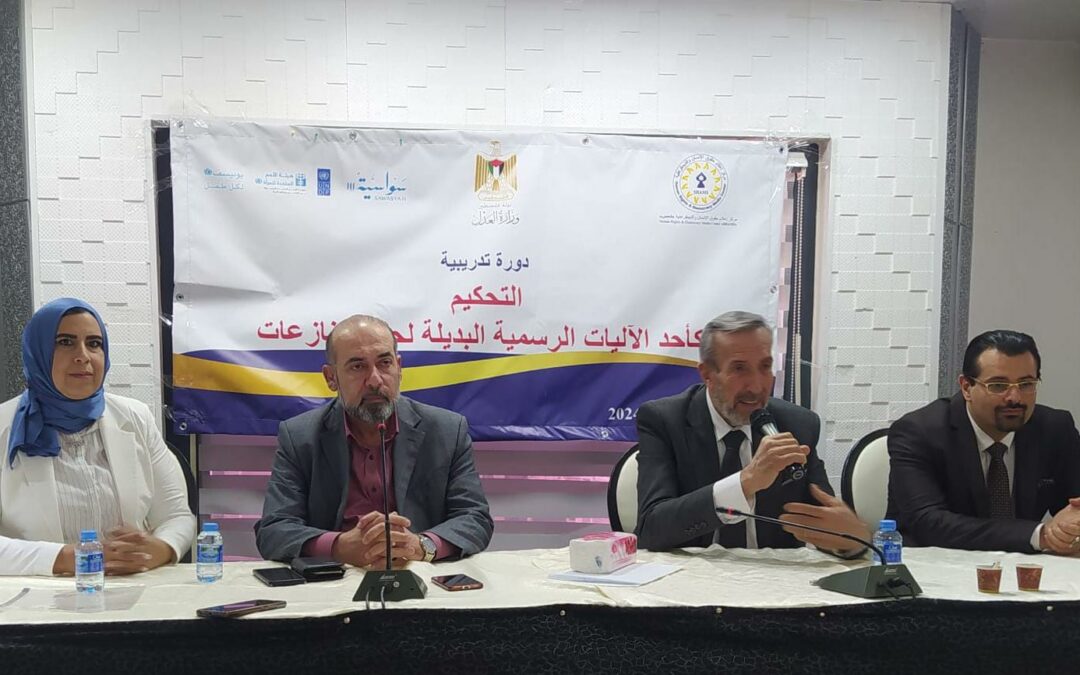Ramallah – The Ministry of Justice, in collaboration with the Human Rights and Democracy Media Center “SHAMS”, and the Sawasya Programme – a joint programme of the United Nations Development Programme, UN Women and UNICEF for promoting the rule of law in Palestine, have concluded a training course – on arbitration as an official alternative method for dispute resolution. The course targeted a group of newly accredited arbitrators for the year 2024 at the Ministry of Justice, aiming to enhance their arbitration skills and understanding of the legal frameworks governing arbitration as an alternative dispute resolution method, and to enable them to actively participate in arbitration procedures.
His Excellency the Minister of Justice, Mr. Sharhabeel Al-Zaeem, participated in the training with the arbitrators. He contributed with an intervention following the opening session, in which he spoke about his experience and expertise in the field of arbitration, attitude, and his support for it, as well as the skills an arbitrator should possess. He also emphasized the importance of arbitration in Palestine, particularly in the current circumstances.
Moreover, Mr. Al-Zaeem stressed the importance of arbitration decisions being well-founded and humane, contributing to bringing the parties closer together and promoting civil peace. He also highlighted the benefits of arbitration as a quick alternative method that saves time and money while fostering reconciliation between disputing parties.
His Excellency, the Minister of Justice, also received the participants’ comments and responded to several questions, promising to make every effort to strengthen the use of alternative methods in Palestine, particularly arbitration.
In her turn, Ms. Amal Al-Faqih, the Executive Director of “Shams” Centre, opened the training session by welcoming the attendees and the participants. She emphasized the importance of the training, which is part of the ongoing efforts of “Shams” Center to enhance access to justice, whether through the formal judiciary or the alternative formal methods such as arbitration and mediation. In light of the major challenges facing the judicial system, including the backlog of cases and delays in resolution, arbitration emerges as a swift and effective means of resolving disputes in a more flexible, cost-effective manner and in a shorter time frame. She also highlighted the vital role of arbitration and mediation in preserving future relationships between parties, praising the efforts made by the Ministry of Justice as a strategic partner in this work and its role in supporting and developing alternative legal tools for dispute resolution through the General Administration of Professional Affairs and the Alternative Methods.
Ms. Al Faqih expressed her gratitude to the colleagues in the Sawasyah Programme (Promoting Rule of Law) for their continuous support for this programme, which has had a significant positive impact on promoting the rule of law and ensuring citizens’ access to justice.
On the other hand, Ms. Maysa Hamarsheh, the Director-General of the Department of Professional Affairs and Alternative Dispute Resolution at the Ministry of Justice, emphasized the importance of the training, which is part of the initial phase of meetings organized by “Shams” Center in partnership with civil society organizations and Sawasya Program. She indicated that the Ministry has been working in partnership with this programme for years, to contribute to enhancing the skills of arbitrators accredited annually by the Ministry of Justice. In addition to improving performance and increase Palestinian citizens’ confidence in the value of resorting to arbitration as an alternative means of resolving disputes, given its benefits, efficiency, and speed, as well as to facilitate citizens’ access to justice.
Mr. Mamoun Atayli, the representative of the Sawasyah joint Programme, emphasized the continuity of the programme, promoting the use of alternative dispute resolution methods in Palestine and the mediation law. He pointed out the existence of certain challenges and obstacles, hoping that through the training, the culture of arbitration would be promoted to citizens, enabling them to become familiar with the alternative methods as they are with the courts. He also stressed the importance of disseminating this culture within Palestinian society, highlighting Sawasya Programme’s efforts to establish a comprehensive framework for this purpose, aiming to encourage the adoption of alternative methods as means for resolving disputes.
During the three-day training course, the trainer and international arbitrator, Dr. Muhammad Abu Ramila, covered several topics, including: principles and fundamentals of arbitration, practical application of arbitration as an alternative method, the regulatory framework governing the work of arbitrators, practical issues in the conduct of arbitration, arbitration agreements and their applications, practical drafting skills for arbitration agreements, procedural rules for arbitration (procedures), mock arbitration panels, issuance of arbitration awards, skills for drafting arbitration awards, challenges facing arbitration awards,Skills for securing the arbitration award, along with an emphasis on active participation, exercises, and practical applications to effectively convey information to the participants.
At the end of the training, the participants recommended the necessity of involving them in more training sessions to gain practical experience, especially in mock trials and practical training, as well as working to raise public awareness about arbitration and increasing citizens’ confidence in the importance of resorting to arbitration as an alternative means of resolving disputes.
His Excellency the Minister of Justice, Mr. Sharhabeel Al-Zaeem, participated with Shams Center along with Sawasya Programme in concluding the training course and handing over certificates to the arbitrators.

